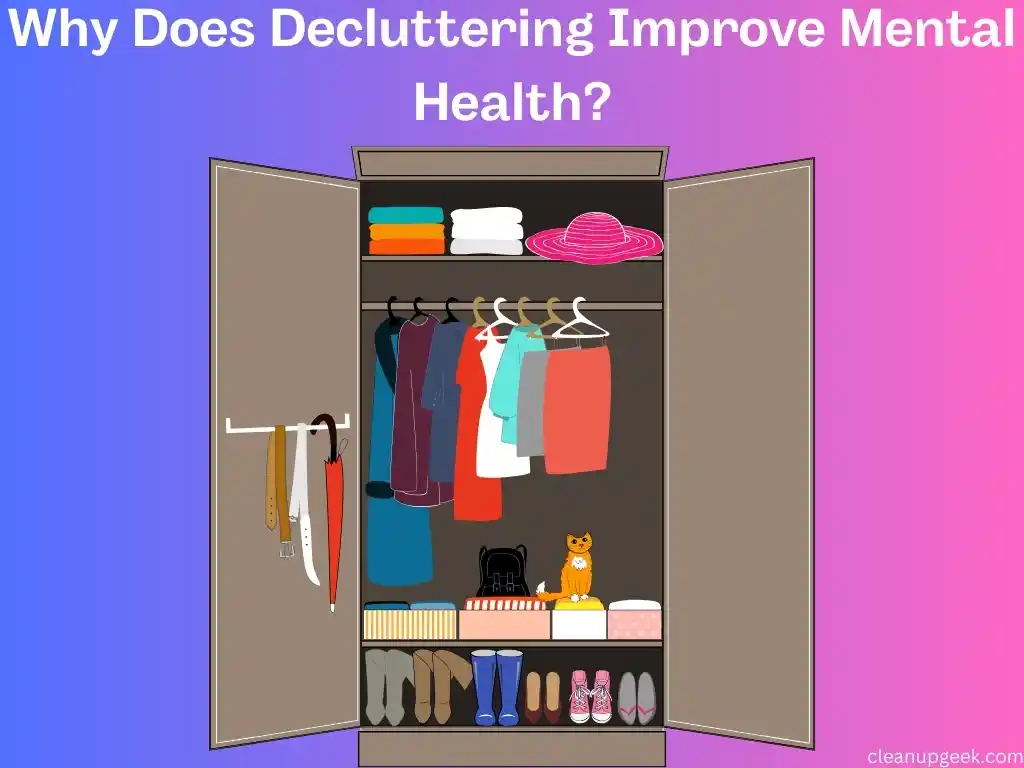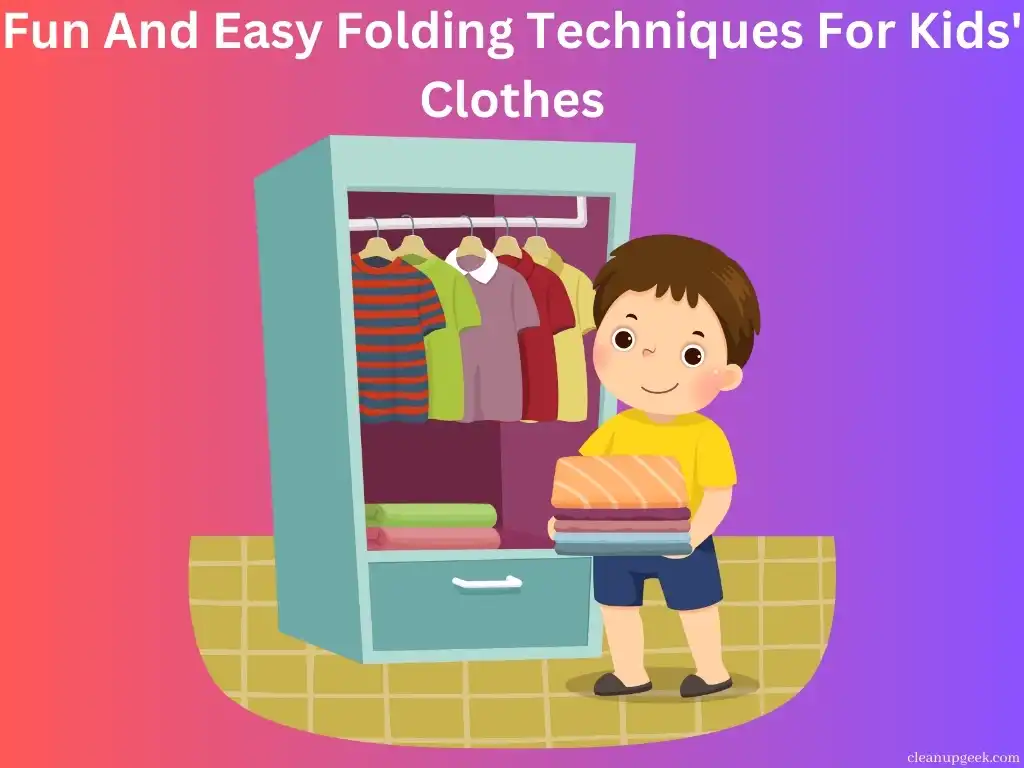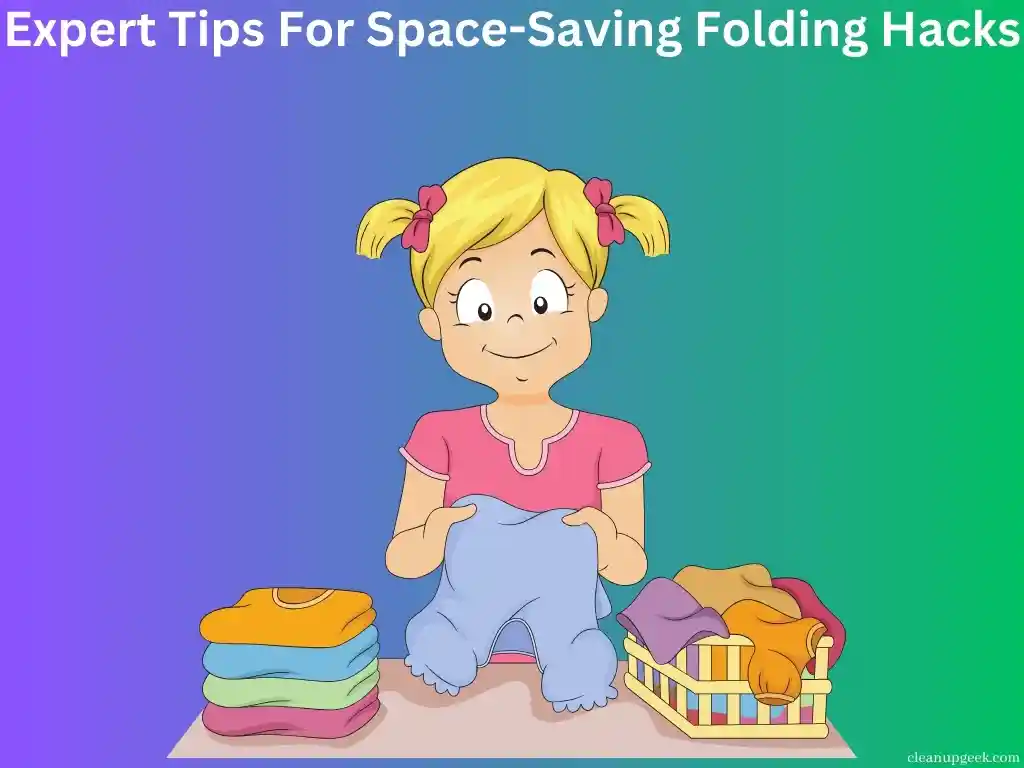Are you feeling overwhelmed by the clutter in your home? Studies show that a tidy space can boost your mental well-being. This article will guide you through the surprising ways decluttering can calm your mind and enhance your life.
Keep reading for some peace-inducing tips!
KEY INFORMATION
- A clean space can make you feel calm, help you focus better, and give you more energy.
- Getting rid of clutter can make you feel good about yourself and help your relationships with others.
- An organized home can lower stress and anxiety, which is good for your mental health.
The Mental Benefits of Decluttering
Watch this tutorial
Title: The Psychological & Mental Benefits of Decluttering
Decluttering can lead to less stress and anxiety, improved focus, increased energy, higher self-esteem, better relationships, and an overall improved lifestyle and well-being. These mental benefits make decluttering an important aspect of self-care.
Less stress and anxiety
A neat space makes you feel calm and in control. When everything is in its place, your mind relaxes. You don’t have to worry about the mess or waste time looking for things. This can lower your stress and anxiety a lot.
The more you organize, the clearer your head feels. It’s good for you because it gives you peace and helps keep nervous feelings away.
Seeing a clean room can also help you take deep breaths and let go of tension. Your home becomes a safe spot where problems seem smaller and easier to handle. This means that making your bed, putting clothes away, or sorting out papers not only tidies up the house but also clears up worries from your mind.
Cleanliness brings comfort as each item goes back to its place without clutter blocking your way.
Improved focus
Clearing away clutter can help you concentrate better. When your environment is organized, you can find things easily and stay focused on the task at hand. This leads to improved productivity and less mental distraction.
Studies have shown that people are better able to process information in uncluttered spaces. Instead of feeling overwhelmed by a messy space, decluttering helps create a clear and calm environment for improved focus and concentration.
Increased energy
Decluttering your space can increase your energy levels. A clean and organized environment reduces the mental burden, allowing you to feel more motivated and energetic throughout the day.
Research shows that a clutter-free space promotes better physical health, which in turn leads to increased energy levels. When your surroundings are tidy, you’re less likely to feel drained and more inclined to stay active and focused on daily tasks.
By decluttering, you create a space that allows for better movement and flow of positive energy. This can directly impact your mood and motivation while also helping you maintain a positive mindset throughout the day.
Higher self-esteem
Decluttering your space can boost your self-esteem. When you clear out the clutter, you create a sense of accomplishment and pride in your environment. This can make you feel more confident and capable, which can positively impact how you see yourself.
By decluttering, you’re showing yourself that you value your space and well-being, which can contribute to a greater sense of self-worth. A tidy and organized home reflects on you as a person, reinforcing positive feelings about yourself.
Remember that clearing out the clutter is not just about physical stuff; it’s also about making space for positivity and growth in your life. Creating an organized environment communicates to yourself that you deserve to live in a clean, peaceful space, promoting feelings of self-worth and confidence.
Better relationships
An uncluttered and organized space can improve your relationships. When your home is tidy, you are more likely to invite friends and family over, leading to stronger connections. Studies show that people feel more at ease in clean environments, making it easier for them to relax and enjoy quality time with loved ones.
Furthermore, decluttering can reduce tension between household members by creating a peaceful and harmonious atmosphere. A clutter-free space allows for smoother communication and fosters a sense of unity within the household, contributing to better relationships overall.
By maintaining an orderly environment, you’re creating a welcoming space for social interactions, and strengthening bonds with those around you. An uncluttered home facilitates meaningful connections and enhances the quality of your relationships with others.
Improved lifestyle and well-being
Decluttering your space can lead to an improved lifestyle and well-being. Research has shown that a clean and organized environment can reduce stress, promote better sleep, and enhance mood.
This can create a positive impact on your emotional health and overall well-being. By simplifying your surroundings, you may experience higher self-worth, lower anxiety levels, and increased energy.
Having a clutter-free home not only makes it easier to find things but also contributes to feeling more at ease in your living space.
Furthermore, decluttering can help in fostering healthier habits and boosting productivity. When everything is organized, you’re less likely to feel overwhelmed or irritable. This can lead to better focus and concentration as well as stronger relationships with those around you.
How to Declutter Your Space

To declutter your space, start by identifying areas that need organization and sorting through items to keep, donate, or discard. Utilize storage solutions and develop a regular cleaning routine to maintain a clutter-free environment for improved mental health.
Tips for decluttering
- Start with one area: Begin decluttering by focusing on one small area at a time, such as a drawer or a shelf. This helps prevent feeling overwhelmed and ensures steady progress.
- Use the four-box method: Have four boxes or bags labeled “Keep,” “Donate/Sell,” “Trash,” and “Relocate.” Sort items into these categories to make decision-making easier.
- Set a timer: Allocate a specific amount of time for decluttering each day to avoid burnout and maintain motivation. Even just 15-30 minutes can make a significant impact over time.
- Create designated spaces: Assign specific places for frequently used items to prevent clutter from accumulating in random spots. This aids in maintaining organization.
- Consider item purpose: When deciding whether to keep an item, assess its usefulness and condition. If it serves no practical function or is damaged, consider parting with it.
Why decluttering is important for self-care
Decluttering is crucial for your well-being. A tidy space can reduce stress, relieve anxiety, and improve your mood. It also enhances self-worth and helps you sleep better. When you declutter, you create an organized environment that promotes relaxation and boosts productivity – all essential for self-care.
Additionally, a clutter-free home can make it easier to concentrate and process information efficiently. So take the time to declutter; it’s a simple yet powerful way to care for yourself.
The effects of clutter on well-being
A cluttered space can lead to increased stress and anxiety, affecting your mood and sleep quality. It can also make it hard to concentrate, leading to decreased productivity and irritability.
Research shows that being in an uncluttered environment can help improve attention, focus, and overall well-being. By decluttering your space, you can create a more organized and clean environment that promotes stress reduction and boosts self-worth.
A tidy home not only improves your physical surroundings but also positively impacts your mental health by creating a peaceful and calming atmosphere.
Moreover, the psychological benefits of decluttering emphasize the power of organizing to enhance one’s life on emotional levels as well. The practice of decluttering has been shown to have spiritual benefits through practices like Feng shui, contributing to mental well-being by promoting harmony within living spaces.
The Connection Between Mental Health and Clutter
Studies have shown that clutter can have a negative impact on mental health, leading to increased stress and anxiety. To discover more about the link between decluttering and well-being, keep reading!
The impact of clutter on mental health
Clutter can seriously affect your mental well-being. Living in a messy and disorganized space can lead to increased stress and anxiety. It may also make it harder for you to focus and concentrate, which can impact your mood and self-esteem.
Research shows that decluttering your surroundings can help reduce these negative effects by creating a more calming and organized environment. This, in turn, can improve your overall lifestyle and sense of well-being.
So, taking the time to declutter could be an important step in promoting better mental health for yourself.
Studies on decluttering and well-being
Studies on decluttering and well-being have provided compelling evidence that clearing out excess stuff can significantly benefit mental health. Research indicates that individuals living in organized spaces report better emotional well-being and reduced stress levels.
| Study | Key Findings |
|---|---|
| Personality and Social Psychology Bulletin | Clutter can lead to decreased levels of life satisfaction. |
| Journal of Neuroscience | Excess items in one’s environment can negatively affect cognitive processes, impacting attention and memory. |
| Environment and Behavior | Cluttered homes are associated with higher cortisol levels, suggesting increased stress. |
| UCLA’s Center on Everyday Lives of Families (CELF) | Women’s stress hormones spike during times when their homes are cluttered. |
| Princeton University Neuroscience Institute | Uncluttered and organized spaces help people concentrate and process information better. |
| Indiana University study | Cleaner home environments correlate with more active, healthier lifestyles. |
Remember, maintaining an organized home isn’t just about aesthetics; it’s a powerful form of self-care that can lead to a clearer mind and a more energized body. As you declutter, you create an environment that supports mental clarity and emotional balance. So grab those storage bins and donation boxes – your mental health will thank you!
Practical Ways to Declutter

Practical Ways to Declutter: Start small by tackling one area at a time, set aside designated decluttering time, and get rid of items you no longer need or use. For more tips on how to declutter effectively and improve your mental health, keep reading!
Benefits of decluttering for self-care
Decluttering your space can do wonders for your self-care. By reducing clutter, you create a more serene and organized environment that can relieve anxiety and improve your mood. A tidy home promotes better sleep and helps you feel more at peace, ultimately contributing to your overall well-being.
Additionally, decluttering can increase self-worth and establish healthy habits, which in turn boost productivity and reduce stress. So, take the time to declutter – it’s a simple way to show yourself some love and care.
Remember that as you tackle this task of decluttering, know that you’re not just tidying up physical items; you’re also nurturing your mental health. Embrace the process as an opportunity to create a tranquil sanctuary for yourself.
How to declutter your home and workspace
Start by setting small, achievable goals for decluttering each area.
- Sort items into three categories: keep, donate, and throw away. Use the “one-year rule” to help decide whether to keep or discard an item.
- Organize items into storage solutions like bins, baskets, and shelves to keep the space tidy and easily accessible.
- Create a designated place for everything to reduce clutter and make things easier to find.
- Regularly declutter by establishing a routine for tidying up and getting rid of unnecessary items.
- Consider the layout of your space to optimize the flow and functionality while minimizing clutter buildup.
- Get rid of duplicates and items you haven’t used in a long time to free up space and create a more organized environment.
When decluttering may not be self-care
Decluttering may not always be an act of self-care when it becomes overwhelming, stressful, or a source of guilt. For some, the pressure to declutter can lead to increased anxiety and feelings of inadequacy instead of bringing relief.
It’s important to recognize that everyone’s pace and process for decluttering will be different; what works for one person may not work for another. Pushing yourself too hard to declutter can create more stress than peace, which goes against the purpose of self-care.
It’s crucial to approach decluttering with compassion for yourself and your unique circumstances. Sometimes, seeking support from professionals or loved ones can make the process feel less daunting and more manageable.
Conclusion and final thoughts
In conclusion, when you declutter your space, you can reduce stress and anxiety. You’ll feel more focused and energized in an organized environment. Your self-esteem will grow, leading to better relationships and overall well-being.
So go ahead and start decluttering for a healthier mind!
FAQs

1. How does decluttering help with anxiety relief?
When you clean up and get rid of clutter, your space feels calm, which can help lower feelings of stress and anxiety.
2. Can tidying up really make me feel better about myself?
Yes! A neat space can boost your self-esteem and self-worth because it makes you feel good about taking care of your environment.
3. Will decluttering my room improve my mood?
Getting rid of mess in a room can lead to mood improvements since a clutter-free area is more relaxing and enjoyable to be in.
4. Does having a tidy home affect overall well-being?
Living in a tidy, organized home helps with well-being as it creates an inviting atmosphere that supports mental health.








